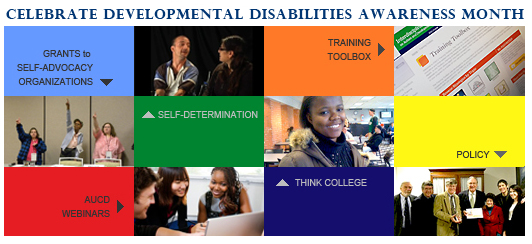AUCD Celebrates March as Developmental Disabilities Month
March 4, 2013

|
On February 26, 1987, President Ronald Reagan designated March as the National Developmental Disabilities Awareness Month. The language of the official Proclamation indicates that before the 1990 Americans with Disabilities Act, Americans were changing their perceptions about people with disabilities. It applauded efforts by the federal government and the private sector to work with advocacy organizations on measures that would help these people achieve "their full potential in school, at work, or at home." More than twenty-five years later, the focus of the month continues to promote acceptance, independence, and self-determination.
The Association of University Centers on Disabilities (AUCD), located in Silver Spring, MD, promotes and supports a national network of interdisciplinary centers on disabilities. The members of AUCD represent every US state and territory and include 67 University Centers for Excellence in Developmental Disabilities (UCEDD), 43 Interdisciplinary Leadership Education in Neurodevelopmental and Related Disabilities (LEND) Programs and 19 Intellectual and Developmental Disabilities Research Centers (IDDRC).
AUCD and our national networks work every day to "advance policy and practice through research, education, leadership, and services for and with individuals with developmental and other disabilities, their families and communities, in support of independence, productivity, and satisfying quality of life." Following are just a few of the highlights of AUCD's current activities in diagnosis, treatment, supports, professional training, research, and education.
Grants to Self-Advocacy Organizations
 |
Supporting self-advocacy organizations and providing technical assistance were some of the top priorities identified by self-advocates attending the 2011-2012 Allies in Self-Advocacy Summits. AIDD subsequently funded this opportunity for self-advocacy groups to increase their organizational capacity. AUCD managed the mini-grant competition and will help administer the grants. The goal of these grants is to provide self-advocacy organizations the opportunity to build their organizations, expand their membership and demonstrate their success.
 |
AUCD advocates for a number of legislative issues that are critical to individuals with disabilities and their families. Legislative priority issues are developed bi-annually by the AUCD Legislative Affairs Committee and Board of Directors. Priority issues are based on the Association's vision and mission as well as input from the entire Network, including individuals with disabilities and their families. Some issues AUCD is actively acvocating for include Medicaid, health care reform, family support, education, employment, research, and autism.
 |
Webinars are a great way to gain information, offering timely information from experts that can be viewed at your convenience without the expense of travel. AUCD hosts multiple webinars throughout the year on topics related to all aspects of developmental disabilities, leadership, training, clinical issues, current Federal legislation, and much more. AUCD's Webinar Library puts all AUCD-hosted webinars at your fingertips, when you want them. In this library you'll find only webinars which have been hosted by AUCD, and a convenient search function makes it easy to find the specific webinar(s) of interest. All AUCD hosted webinars are free to watch both live and archived.
 |
The Training Toolbox was created after hearing requests from Directors and staff of MCH Training Programs for a way to easily share what other programs are doing: how they're training trainees in certain topics, what approaches work in different environments, and how to get new ideas. The Training Toolbox makes it easy for staff to browse and share innovative and time-tested training strategies on a variety of topics relevant to leadership and Maternal and Child Health. In the Toolbox, training strategies are categorized by topic, making it easy for you to browse different methods by which others teach important concepts to their trainees, and save strategies you feel could be applicable in your program to a folder of your personal favorites.
Self-Determination
National Gateway to Self-Determination
 |
Self-determination is the characteristic of a person that leads them to make choices and decisions based on their own preferences and interests, to monitor and regulate their own actions, and to be goal-oriented and self-directing. The National Gateway to Self-Determination provides a single access for self-advocates, professionals, policy-makers and the general public on the current best practices and evidence-based activities in enhancing self-determination in the lives of people with developmental and intellectual disabilities, as well as any individual.
 |







